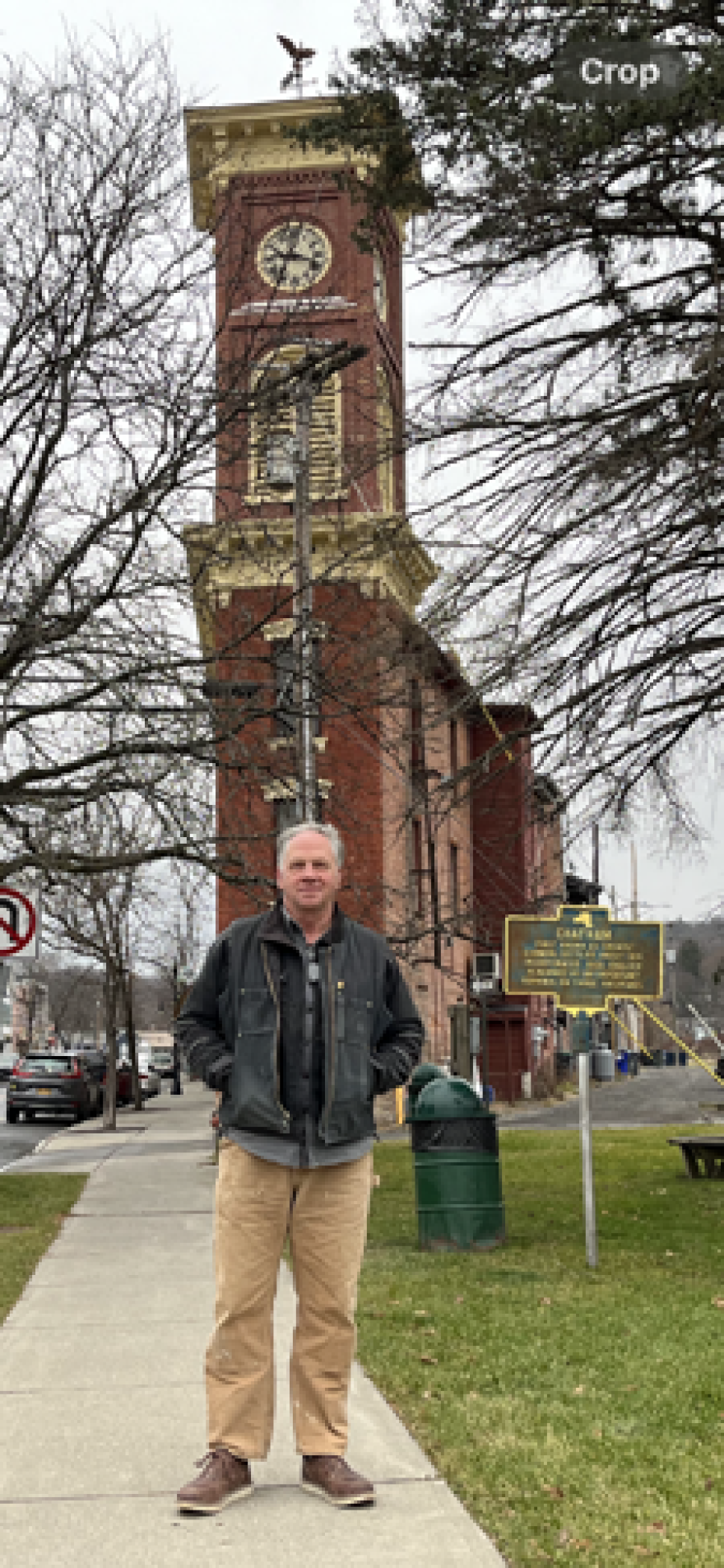Imagine if the division roiling the country -- that blue states/red states thing, MSNBC vs. Fox News, the heated rhetoric and conspiracy theories metastasizing on social media – is grossly exaggerated, a manipulation, simulated reality.
That hopeful thought came to mind last Sunday after I’d followed Stephen Piazza, a public-spirited private citizen, to the summit of the red brick 19th century clock tower in Chatham, NY. Steve, a contractor by profession, wears several hats in this northern Hudson Valley town.
He’s a member of the zoning board, a mentor in the middle school and the bass drummer in the Ghent marching band. The towns of Chatham and Ghent share a border. But I was visiting Steve as he performed perhaps his most awesome responsibility of all: making sure that Chatham’s antique, four-sided clock keeps to the minute.
I think we can agree that public clocks are largely unnecessary in our digital age. We have timepieces as accurate as the one at the U.S. Naval Observatory on the phone in our pocket. But maybe that misses the point. One of the charms of visiting ancient European cities is the hourly soundtrack of medieval cathedral bells.
Like their continental cousins the clock in Chatham does more than broadcast the time. It connects the present to the past and maybe even the town’s citizens to one another. “There’s a handful of guys who have wound the clock,” Steve said of his predecessors going back to 1872 when the clock, manufactured by Boston’s E. Howard & Co., was lifted to the summit of the tower. “A handful are still with us. As far as I know there’s no clock winder’s association. Don’t you think there should be?”

He wasn’t going to get any argument from me. In fact, I might have been the one who suggested there ought to be a national federation of town timekeepers. There seem to be far more frivolous cliques and confabs gathering regularly to celebrate themselves.
Steve has kept the town’s time on and off since the 1990’s. It’s a majestic chore and not one for the weak of heart – both metaphorically and metabolically. When I was introduced to him a few days earlier by Bruce Shenker, a mutual friend, an environmental activist and another of those people who contributes to the adhesive that helps bond the community, Steve invited me to join him on one of his twice-weekly ascents to wind the clock. I readily agreed, not realizing that I was taking my life in my hands.
Or maybe age has made me more risk adverse than I once was. Reaching Chatham’s zenith – the handsome clock tower stands as the informal gateway to Main Street – requires passing through three trap doors, climbing three sets of severely steep ladders, and crawling under the clock’s hail companion, the huge bell that rings every hour on the hour, chiming the appropriate number of times.
For his Thursday and Sunday efforts Steve gets paid the princely sum of $300 a year. Obviously, he’s not in it for the money. But a little more official recognition wouldn’t hurt. “I don’t need a gun,” he explained. “But I’d like a badge.”
In the meantime, he must do with the accolades and occasional criticism of his fellow Chatham residents. Some light sleepers aren’t happy that the clock doesn’t give it a rest at night. But Steve rightly brushes off the complaints. “It was here before they were,” he noted. Indeed, the device made its debut the same year that Ulysses S. Grant was elected to a second term as President of the United States.
Other members of the community welcome the intrusion – if you’re noise averse what about the freight trains regularly barreling through town? – and they depend on the clock, if not exclusively, to keep them running on time. “If the clock didn’t ring you hear about,” Steve said as we reached the remarkably well-preserved mechanism, without suffering noticeable bumps and bruises, and Steve started to wind it. “It’s the heartbeat of the village,” he said.
Steve actually gets good-natured grief if the clock is off. One neighbor, who uses the device as his morning alarm clock, stopped him at the hardware store to observe that it was running show.
It’s not. After Steve wound the clock – a surprisingly labor-intensive effort involving turning a crank 130 times on Thursdays, slightly less on weekends, that raises weights, like a giant cuckoo clock’s, from the bowels of the building – we waited for the clock to strike ten.
The town timekeeper predicted the bell would start to chime at thirty-five seconds to the hour. He was ten seconds off. It began to toll at 9:59 and 25 seconds. The tenth and final chime occurred at 10 o’clock and two seconds. “When I talk to clock people and say I can get it within a minute,” he boasted gently as we began our descent, “they say that’s pretty remarkable.”
I may have suggested that climbing the clock tower twice a week, risking a coronary and never taking a break from the chore, might be considered a hardship by some. Steve disagreed. “There’s not a time I wind the clock and I don’t love it,” he said.
I’m not exactly sure what the mental process was about this anachronistic chore and the man performing it that gave me hope for the future of democracy. Maybe it was the sense of continuity, the clock faithfully ticking through previous perils to the Republic. Or the modest acts of service probably likewise contributed by citizens in communities throughout the country.
More than anything else, I suppose it’s the realization that what makes democracy remarkable isn’t the sound and fury of our leaders but the small acts of cohesion, the abiding faith of the many in the notion of community itself. Maybe it’s just easier to hear that gentle beat in an old bell tower on a quiet Sunday morning.


